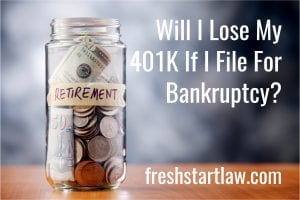Will I Lose My 401k If I File For Bankruptcy?

Get expert guidance on retirement savings and bankruptcy. Contact Sirody & Associates for a free consultation. Or call (410) 415-0445.
How Are Americans Saving For Retirement?
At the present time, only 13% of Americans are estimated to have pensions. Therefore, other means of saving for retirement have become popular. 401k accounts are an attractive retirement savings vehicle, because contributions are generally tax free. Also, many employers offer the option of deducting contributions automatically from weekly or monthly earning, which making it easier to stick to a savings plan. The US Census Bureau recently reported that 79% of Americans work for a company that offers a 401k plan, and of this group, 41% choose to contribute to the plan. Another popular vehicle for retirement savings is an IRA; there are several varieties of IRAs available to consumers. Approximately one-third of Americans currently have an IRA. Sometimes, even with the most careful planning, an unexpected financial situation can develop. Divorce and medical debt are two common scenarios that may be unexpected and can seriously impact your financial stability.
Which Retirement Accounts Are Exempt?
For both Chapter 7 and Chapter 13 bankruptcies, almost no retirement accounts or pension plans are affected. This means your accounts will not be reduced to pay any creditors. In general, these accounts are protected under the Employee Retirement Income Security Act (ERISA). The plans that are protected include:
- 401k
- 403b
- IRAs (Roth, SEP and SIMPLE) – see more about this below
- Keoghs
- Profit-sharing plans
- Money purchase plans
- Defined-benefit plans
Even though these accounts are protected in the majority of bankruptcy cases, it’s a good idea to verify this with your employer or fund administrator. A good attorney can help guide you in this process.
Other items that are generally exempt from Chapter 7 bankruptcy include:
- Personal home
- Insurance policies
- Personal property (appliances, furniture, clothing, etc.)
- Trade tools
- Wages (amounts may depend on county of residence)
IRAs Are Treated Differently
Traditional IRAs and Roth IRAs are both exceptions to the rule. In the case of a bankruptcy, all IRA plans will be protected up to a total of $1,283,025. It’s important to note that this is the total for all plans, not for each individual plan. Any savings over this amount may be used to pay back creditors during bankruptcy proceedings.
This exemption amount is adjusted every three years to account for cost of living increases. Additionally, exemption rules may vary from state to state, so it’s worth consulting with a qualified local attorney about the rules that are specific to your state.
Retirement Benefit Payments
As long as your funds are in a retirement account, the money is protected as described above. However, if you are receiving retirement benefit payments, this income could be used to pay back creditors during bankruptcy. The decision about whether or not benefit payments will be used depends largely on your total income and your costs of daily living.
For example, in Chapter 13 bankruptcy, a payment plan will be arranged for you to pay back your creditors. Any income, including retirement benefit payments, can be used in determining the amount of your payment. Also, if you have previously withdrawn money from your retirement account, this money might be used to pay back creditors. In a Chapter 7 bankruptcy, any assets you have purchased with withdrawn funds may be sold to pay your debts.
Bankruptcy Is A Solution
For anyone facing a serious debt problem, bankruptcy may the be best solution. Bankruptcy law isn’t designed to punish you. Instead, it’s a fully legal process that allows you to pay your debts and restore your financial stability. Working with an experienced bankruptcy attorney can help minimize any negative impact to your retirement savings.
Get advice from a top Baltimore bankruptcy lawyer. Contact Sirody & Associates for a free consultation. Or call (410) 415-0445.
